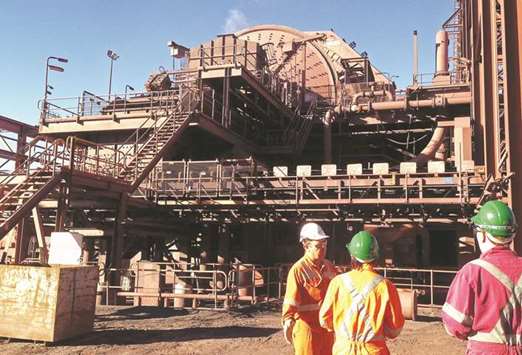BHP Billiton Ltd’s incoming chairman is assuring shareholders during his closed-door, global roadshow that the world’s top miner is listening to concerns on its asset mix and the composition of its board against the background of an activist investor campaign.
Ken MacKenzie, the 53-year-old former packing sector executive who will replace Jac Nasser as chairman from September, has held discussions with shareholders in Australia this week as part of a series of planned meetings that’ll also take in the US and UK.
“His mind is on the size of board,” Robert Penaloza, head of Australian equities at Aberdeen Asset Management Plc, said by phone, after attending a meeting with MacKenzie this week. “He’s mindful that you don’t want stale, pale, frail and male on the board – those are my words, not his.” BHP last year pledged to seek a gender-balanced workforce by 2025. Aberdeen, which manages about $385.2bn globally, is the second-largest holder of BHP’s London-listed shares, according to data compiled by Bloomberg. BHP declined to comment on details of MacKenzie’s discussions with investors.
An investor campaign over recent months spearheaded by Elliott Management Corp has rounded on management decisions that the fund claims have destroyed about $40bn in value. MacKenzie doubled the market value of packaging company Amcor Ltd in a decade-long spell as CEO that ended in 2015 and joined BHP’s board last year.
“What Ken was clear on is that they want to be clear what they can be great at. What are they good at, and where can they be great and scale up,” Aberdeen’s Penaloza said. “To me that reads as though there is going to be some sort of review – and we question things like potash and unconventional oil.”
Investors including Schroders Plc, Escala Partners, AMP Capital, and Tribeca Global Natural Resources Fund have followed Elliott in raising questions over Melbourne-based BHP’s strategy. Some are calling for a review of the oil operations, proposing a sale of US shale assets and questioning a potential investment to develop a $13bn potash unit in Canada. Elliott went public in April with a campaign demanding a corporate overhaul and improved shareholder returns.
BHP has rejected many of Elliott’s criticisms, though Nasser last month said the timing of the producer’s $20bn spree into US shale in 2011 was a misstep, and that if the miner could go back in time, it wouldn’t have invested in the assets.
Both Tribeca and Elliott have also called for an overhaul of the producer’s 11-person board. Tribeca said in June it has canvassed potential candidates, while Elliott has called for the incoming chairman to review BHP’s executive management and nominate new directors. MacKenzie indicated he’s likely to change the board’s skill set if it’s considered necessary, according to Jason Beddow, chief executive officer of Argo Investments Ltd, who also met with MacKenzie this week. Delivering any major changes at BHP will take time, Beddow said.
“He’s pretty open, and he wants to hear people’s views on the operations, structure, management and the board,” Beddow said by phone. “He’ll be good for BHP over time.” Argo manages about A$5bn ($4bn) in Australia and holds BHP shares. BHP shares were little changed at 1,315 pence by 12:26pm in London, and the stock traded in Australia closed down 1.1%.
MacKenzie is likely to bring a focus on return on capital and balanced reinvestment, Morgan Stanley analysts including Menno Sanderse wrote in a note Monday. His arrival in the role may prompt another portfolio review, with a focus on the Jansen potash project and shale assets, the analysts wrote.
The new chairman is about begin “a radical shift” at BHP, according to Sanford C Bernstein Ltd, which said this month in a note that he will probably undertake a full-scale review of assets and strategy, and may demerge the petroleum business.
BHP could seek board approval as early as June next year to begin a $4.7bn first phase of production from Jansen from about 2023, CEO Andrew Mackenzie said in a May speech to a conference in Barcelona. The producer forecasts potash demand could double by the late 2040s to develop into a $50bn market.
MacKenzie is “definitely a fresh pair of eyes,” Aberdeen’s Penaloza said. “He’s listening to very frank and candid views from investors.”

Officials stand near the grinding mill at BHP Billiton’s Olympic Dam copper and uranium mine located in South Australia. The company’s incoming chairman Ken MacKenzie has held discussions with shareholders in Australia this week as part of a series of planned meetings that’ll also take in the US and UK.
